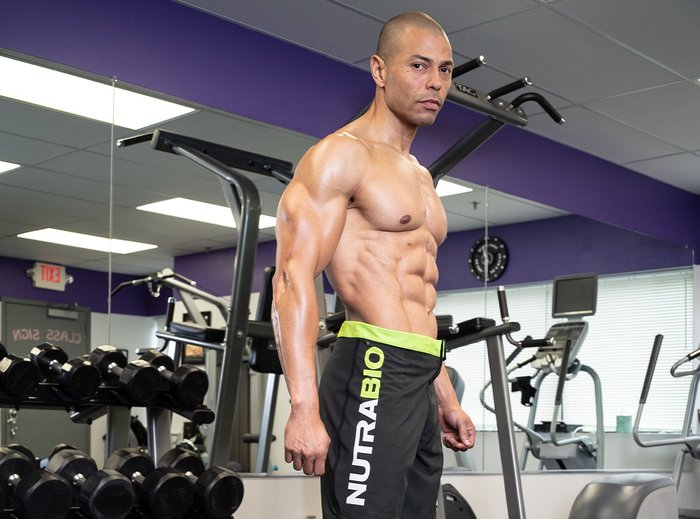Some people complain that building muscle naturally is ineffective, but usually what's not working is their bulking protocol.
IFBB pro athletes Amanda Aguzzi and Tim Santiago are proud natural bodybuilders who come by their gains the hard way. Steal their playbook for building high-quality mass naturally.
1. Set Realistic Expectations
Getting jacked naturally takes years of hard work and sacrifice. So if the Incredible Hulk isn't staring back at you in the mirror after a month or two of bulking, don't grow discouraged and quit.
"Packing on natural muscle takes patience and persistence," Aguzzi says. "A good amount of muscle gain can be achieved by gaining 10-15 pounds over 6-12 months. It took me about a year to add noticeable muscle and three years to increase muscle mass."
While it can take years to transform your body, you'll begin to see subtle progress sooner than that.
"Most beginners can expect to see noticeable muscle growth within eight weeks of starting a new program," Santiago says. "More experienced lifters will see noticeable change in 3-4 weeks."

2. Track Your Fuel Intake
Eating "a lot" isn't good enough. What feels like a lot can be much less than the calorie surplus it takes to put on weight.
"Often people who want to gain lean muscle are not consuming enough calories and are not eating frequently enough," Aguzzi explains. "Our muscles need food to grow. Without enough calories, our body can enter a catabolic state, destroying the muscles we work so hard to gain."
Santiago stresses the importance of knowing your calorie intake and adjusting it up gradually. "It is important to control the surplus by slowly adding in calories each week to avoid too much fat gain," he says. "Before you begin, you should track your intake for a week to figure out what your baseline calorie amount is."
Both athletes agree that 1 gram of protein per pound of body weight is the bare minimum for increasing muscle mass, and that eating frequent meals is the way to go. But you may need to tailor your plan based on how your body responds.
"Different individuals may require different macronutrient ratios," Aguzzi says. "For me, keeping protein around at least 1-2 grams per pound of body weight really assists muscle growth."

3. Eat Enough Carbs
Many lifters eat low carb in the hopes of staying lean, but this approach can make gaining muscle an uphill battle. Carbs are important for two reasons: avoiding catabolism (muscle loss) and creating glycogen to fuel your workouts.
According to Santiago, restricting carbs is one of the biggest mistakes people make when trying to build muscle. "Carbs are necessary because your body will prioritize burning carb calories first, protecting protein stores," he explains.
And without adequate glycogen, you won't be able to produce the kind of effort in the gym that turns on the "get bigger" switch.
"I always aim to eat carbohydrates before workouts so they will be broken down and used as fuel, and again after workouts to replenish those depleted glycogen stores," Aguzzi says.

4. Prioritize Sleep
We all lead busy lives, and often it seems like the only way to make time for one thing is to sacrifice another. But skipping sleep to train at zero dark thirty shoots your gains in the foot.
"Sleep and rest are very important for muscle recovery and growth," Santiago explains. "If you don't get enough sleep, your body doesn't have enough time to recover, grow muscle, and burn fat."
Being sleep deprived also makes you more likely to phone in your next workout. If you have to choose one, choose sleep. Always aim for 7-8 hours per night.
5. Gear Your Workouts Toward Building Muscle
In general, the tried-and-true workout formula for hypertrophy, or muscle growth, includes moderate rep ranges, body-part splits, and plenty of rest.
"You want to train the muscle with 3-4 sets at a weight where you can achieve muscle failure at 8-12 reps," Santiago says. "People also do not need to do 6-7 exercises per muscle group. Doing too much can cause overtraining, which is counterproductive when building muscle,"
He recommends doing 4-5 exercises per muscle.
"There are many different programs or body-part splits that you can use," he adds. "For example, you can do a push/pull/legs split, an upper/lower body split, a 4-day split, or a 5-day split. I personally use the latter."
Whatever approach you choose, he recommends changing it every 6-8 weeks so your body doesn't get complacent.
Schedule your body-part splits with plenty of time to rest each muscle group before you work it again.
"For our muscles to grow, they must fully recover," Aguzzi explains. "Hitting isolated body parts 1-2 times a week with at least two days of rest in between gives muscles more time to repair and rebuild."

6. Slow Down Your Rep Speed
The tempo at which you lift and lower the weights can affect the outcome of your workout. When you lift for hypertrophy, move slowly.
"Muscles grow when they are under tension for longer periods of time," Santiago says. "Slow and controlled reps mean longer time under tension for that muscle." He adds, "Using slower reps also allows you to concentrate on using proper form and really feel the muscle working."
7. Supplement Smartly
The most important supplements for gaining mass naturally fall into three categories: protein, aminos, and creatine. Here are Amanda and Tim's bulking stacks.

Amanda Aguzzi
"I love this protein because it is clean, easy to digest, and contains an abundance of naturally occurring BCAAs."
"Amino acids are the building blocks of protein and therefore essential for muscle growth. As a natural and meat-free athlete, aminos are an essential part of my day."
"This product (as well as NutraBio PRE) comes sweetened with stevia in the natural line, making it easy to cut out artificial colors, flavors, and sweeteners."
"HMB helps promote lean muscle mass, making it a great supplement to gain weight."
Tim Santiago
"It is lower in fats and carbs than whey concentrate, and lower in lactose which makes it easier to digest."
"Creatine helps your muscles produce energy during heavy lifting by increasing your stores of phosphocreatine, which helps your body produce ATP. Creatine can also act as a lactic acid buffer, which helps improve exercise recovery time."
"Sometimes people find it hard to gain muscle, and have a hard time getting the calories in. Extreme mass incorporates a combination of a fast absorbing whey protein concentrate with a slower absorbing micellar casein."
"The essential amino acids leucine, isoleucine, and valine help promote lean muscle growth, increase muscle strength, help decrease post-exercise soreness, and help maintain an anabolic (muscle growing) environment."
8. Get Out of Your Comfort Zone
You'll know your training is working when it stops being fun.
"Your body has the ability to adapt to everything you do," says Santiago. "If you consistently lift weights that are comfortable to you, the body develops a tolerance and you will not see the progress you are looking for."
Or, as he puts it more bluntly: "Don't just lift the weights, body-build! Get in the gym and lift heavy and push yourself beyond your comfort zone, because that is what will change your body."
9. Be Consistent
Gaining muscle is a 24/7 project. Even on your rest days, you can't take a break from eating like a beast and sleeping like it's your job, or it won't work. When it comes to building mass, dedication is the closest thing there is to a magic pill.
As a personal trainer, Santiago knows this well. "My biggest piece of advice for anyone trying to get big is consistency, consistency, consistency!" he says. "Set a goal, stick to the plan, stay motivated, be patient, and make sure your nutrition is on point."
Aguzzi agrees that the formula is simple, as long as you stick with it. "If you train hard, eat clean, and rest well, your muscles will want to grow," she emphasizes.
It will take forever. You will become discouraged. But these things do work—just slowly, and only if you stay committed. See you in the gym.


